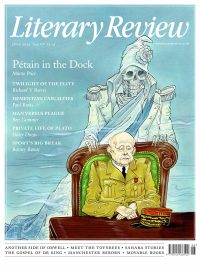Carlos Fraenkel
Sage of Sepharad
Maimonides: Faith in Reason
By Alberto Manguel
Yale University Press 256pp £16.99
Did you know that John Milton cited the medieval Jewish philosopher Maimonides to justify his radical views on divorce after Mary Powell, his estranged wife, left him? On Maimonides’s authority, Milton reported that Moses had ruled that ‘peace and quiet in the family’ are more important than holding on to a mismatched union. It’s one of dozens of appearances Maimonides makes in the works of the world’s greatest writers, from Thomas Aquinas and Leibniz to Kafka and Derrida. These are catalogued by Alberto Manguel in the last chapter of his book on Maimonides, part of Yale University Press’s Jewish Lives series. To find Maimonides in such illustrious company is not surprising, given that Manguel is one of the greatest bibliophiles of our time. A cosmopolitan Jew originally from Argentina (he read to the blind Jorge Luis Borges in Buenos Aires as a teenager and later became director of the National Library of Argentina), he at one time owned a collection of over 35,000 books. Some of his best-known works (A History of Reading, The Library at Night) are declarations of love to libraries and reading. Here, his erudition sparkles in freewheeling associations – he invokes Socrates, Seneca, Coleridge, Cynthia Ozick and many others – that shine a light on Maimonides’s life and work.
Maimonides (1138–1204) was the foremost Jewish philosopher of the Middle Ages. Like his Muslim colleague Averroes (1126–98), he was born in Córdoba in the twilight of the ‘golden age’ of Muslim Spain (known as Sepharad in Hebrew and Al-Andalus in Arabic). As members of the Spanish school of Arabic

Sign Up to our newsletter
Receive free articles, highlights from the archive, news, details of prizes, and much more.@Lit_Review
Follow Literary Review on Twitter
Twitter Feed
Under its longest-serving editor, Graydon Carter, Vanity Fair was that rare thing – a New York society magazine that published serious journalism.
@PeterPeteryork looks at what Carter got right.
Peter York - Deluxe Editions
Peter York: Deluxe Editions - When the Going Was Good: An Editor’s Adventures During the Last Golden Age of Magazines by Graydon Carter
literaryreview.co.uk
Henry James returned to America in 1904 with three objectives: to see his brother William, to deliver a series of lectures on Balzac, and to gather material for a pair of books about modern America.
Peter Rose follows James out west.
Peter Rose - The Restless Analyst
Peter Rose: The Restless Analyst - Henry James Comes Home: Rediscovering America in the Gilded Age by Peter Brooks...
literaryreview.co.uk
Vladimir Putin served his apprenticeship in the KGB toward the end of the Cold War, a period during which Western societies were infiltrated by so-called 'illegals'.
Piers Brendon examines how the culture of Soviet spycraft shaped his thinking.
Piers Brendon - Tinker, Tailor, Sleeper, Troll
Piers Brendon: Tinker, Tailor, Sleeper, Troll - The Illegals: Russia’s Most Audacious Spies and the Plot to Infiltrate the West by Shaun Walker
literaryreview.co.uk